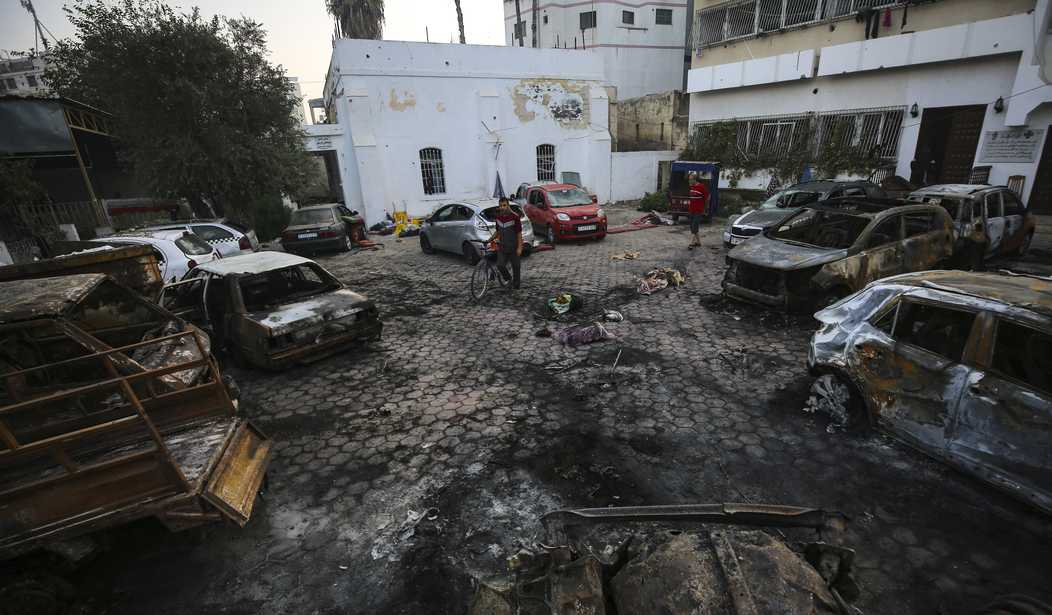As RedState reported, one of the biggest press failures in modern history recently occurred surrounding the "bombing" of the Al-Ahli Baptist Hospital in Gaza.
As darkness fell over the strip on October 17th, an explosion occurred somewhere on the hospital grounds. About a half-an-hour later, reports from The New York Times, CNN, MSNBC, NBC News, The Washington Post, and many others painted a grim picture of a demolished facility and at least 500 dead. Their source? "Palestinian health authorities."
None of them stopped to ask any questions, including how the Hamas-controlled Gaza Health Ministry could have possibly produced an accurate death toll in under an hour. They also didn't even consider initially the possibility that a terrorist-fired rocket had caused the blast. Worse, they didn't even confirm that the hospital had been hit.
By the next morning, it had become clear that the reporting wasn't just wrong, but astonishingly so. The hospital had not been hit. Rather, a Palestinian Islamic Jihad rocket had misfired nearby and fallen onto the parking lot. Further, the estimated dead by an EU intelligence source was between 10 and 50, which was consistent with the fact that several dozen people were camping out in a courtyard nearby. The hospital itself only suffered a few broken windows.
A week after the incident, The New York Times has finally released an editor's note on the matter.
The NYT offers an editors’ note — not a correction — on its coverage of the Gaza hospital:
— Josh Kraushaar (@JoshKraushaar) October 23, 2023
“Times editors should have taken more care with the initial presentation, and been more explicit about what information could be verified.” https://t.co/FmY8nvwgdE
The Times’s initial accounts attributed the claim of Israeli responsibility to Palestinian officials, and noted that the Israeli military said it was investigating the blast. However, the early versions of the coverage — and the prominence it received in a headline, news alert and social media channels — relied too heavily on claims by Hamas, and did not make clear that those claims could not immediately be verified. The report left readers with an incorrect impression about what was known and how credible the account was.
Do you know what you do when you leave readers with an incorrect impression? Especially one that has been disproven by a mountain of proceeding evidence? You correct the story. Instead, the Times decided to put out a separate note, which they put behind a paywall. What a pathetic showing from the supposed gold standard in journalism.
Times reporters relied solely on Hamas-sourced information for hours, repeating completely improbable death totals without giving any semblance of a nod to the serious uncertainty of the situation. That is not journalism. It's activism, and it's become engrained in the Times and nearly every other mainstream press outlet in the Western world.
Given the sensitive nature of the news during a widening conflict, and the prominent promotion it received, Times editors should have taken more care with the initial presentation, and been more explicit about what information could be verified. Newsroom leaders continue to examine procedures around the biggest breaking news events — including for the use of the largest headlines in the digital report — to determine what additional safeguards may be warranted.
Pretending that the presentation, including the size of the headline, was the problem here is completely disingenuous. The problem was treating Hamas like a trustworthy source when it is a terrorist group with no more credibility than ISIS. Who runs the Gaza Health Ministry is not a secret, and the Times knew exactly who they were quoting as an authority. That is going to leave many people justifiably questioning whether this was a "mistake" or simply the natural outgrowth of the Times' gross anti-Israel bias. I know where my money is.














Join the conversation as a VIP Member